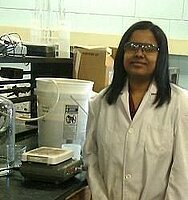Plant-based Biopolymers for Entrapping Metal Nanoparticles for Arsenic removal: Biodegradation and Treatability Studies

Dhritikshama Roy is a doctoral student in Environmental Conservation Sciences (ECS) program in Civil Engineering at North Dakota State University (NDSU). Dhriti holds MS degrees from Nicholls State University, LA (2009) and the University of Kalyani, India (2004) and a BS degree from North Bengal University, India (2002). Her MS research included treatment of aquaculture wastewater using sequencing batch reactor (SBR), pretreatment of lignocellulose for ethanol production, and study of microorganisms associated with oyster. At NDSU she is presently working on microbial biodegradation of polymers used for surface modification of metal nanoparticles for groundwater remediation.
Email: Dhritikshama.roy@ndsu.edu
Phone: (701) 231-8955
Fellow: Dhritikshama Roy
Advisor: Achintya Bezbaruah, Ph.D., Assistant Professor, Department of Civil Engineering, North Dakota State University.
Degree Progress:Ph.D. in Environmental Conservation Sciences expected in Fall 2012.
Plant-based Biopolymers for Entrapping Metal Nanoparticles for Arsenic removal: Biodegradation and Treatability Studies
Because of their high surface area (20–50 m 2g -1), reactivity and unique physical structure metal and metal oxide nanoscale particles have been used for remediation of various organic and inorganic contaminants including arsenic. While such nanoparticles are expected to disperse in aqueous media, they agglomerate due to magnetic and Van der Waals forces. Thus, larger particles are formed and they settle into aquifer media pores. Agglomerated particles have decreased specific surface area and, hence, lose the reactivity characteristic of individual nanoparticles. Polymers are used to overcome the problem of agglomeration by making them more dispersible via surface modification. Surface modified metal nanoparticles have shown higher reactivity towards contaminants. However, the polymers used for surface modification have been reported to be non-biodegradable in groundwater environment. Lack of biodegradation may limit the use of these polymers in groundwater. Non-biodegrable surface modifiers may themselves become ‘pollutants’. It is, therefore, imperative to develop and use polymers which are easily degradable to benign end products in aqueous environment. The on-going project is focused on identification and isolation of microorganisms that will help in the process of polymer biodegradation. The surface modifiers that are being tested include conventional synthetic and plant-based polymers.
Project Objectives:
The general objectives of this research are the identification and testing of biodegradable plant-based polymers for metal nanoparticle surface modification. This project will specifically focus on understanding the microbial degradation process involving synthetic and plant-based polymers. Appropriate modifications of bacterial consortium will be made based on the study results. The specific objectives of the study are:
- Study of biodegradability of polymers presently used as surface modifiers (e.g., polysiloxane and plant-based polymers) for nanoparticles used for groundwater remediation.
- Identification and isolation of microorganisms responsible for polymer/surface modifier biodegradation.
- Study of biodegradable polymer modified metal nanoparticles for contaminant (e.g., arsenic) degradation.
Progress:
- Polymer biodegradation batch studies are on-going
- Experiments targeted at identifying and isolating microorganism capable of degrading polymers used as nanoparticle surface modifiers have been started.
Significance:
- Development of environmentally safe (biodegradable) polymers for surface modification of nanoparticles.
- Identification and isolation of specific microorganisms which are responsible for polymer biodegradation.
- Development of polymer coated nanoparticles for aqueous arsenic removal.

Achintya Bezbaruah
Civil & Environmental Eng.
Office: Civil/Ind Eng 201G
Telephone: 701-231-7461
Email: a.bezbaruah@ndsu.edu


